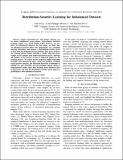Distribution-sensitive learning for imbalanced datasets
Author(s)
Song, Yale; Morency, Louis-Philippe; Davis, Randall
DownloadDavis_Distribution-sensitive.pdf (286.4Kb)
OPEN_ACCESS_POLICY
Open Access Policy
Creative Commons Attribution-Noncommercial-Share Alike
Terms of use
Metadata
Show full item recordAbstract
Many real-world face and gesture datasets are by nature imbalanced across classes. Conventional statistical learning models (e.g., SVM, HMM, CRY), however, are sensitive to imbalanced datasets. In this paper we show how an imbalanced dataset affects the performance of a standard learning algorithm, and propose a distribution-sensitive prior to deal with the imbalanced data problem. This prior analyzes the training dataset before learning a model, and puts more weight on the samples from underrepresented classes, allowing all samples in the dataset to have a balanced impact in the learning process. We report on two empirical studies regarding learning with imbalanced data, using two publicly available recent gesture datasets, the Microsoft Research Cambridge-12 (MSRC-12) and NATOPS aircraft handling signals datasets. Experimental results show that learning from balanced data is important, and that the distribution-sensitive prior improves performance with imbalanced datasets.
Date issued
2013-04Department
Massachusetts Institute of Technology. Computer Science and Artificial Intelligence Laboratory; Massachusetts Institute of Technology. Department of Electrical Engineering and Computer ScienceJournal
Proceedings of the 2013 10th IEEE International Conference and Workshops on Automatic Face and Gesture Recognition (FG)
Publisher
Institute of Electrical and Electronics Engineers (IEEE)
Citation
Song, Yale, Louis-Philippe Morency, and Randall Davis. “Distribution-Sensitive Learning for Imbalanced Datasets.” 2013 10th IEEE International Conference and Workshops on Automatic Face and Gesture Recognition (FG) (n.d.).
Version: Author's final manuscript
ISBN
978-1-4673-5546-9
978-1-4673-5545-2
978-1-4673-5544-5